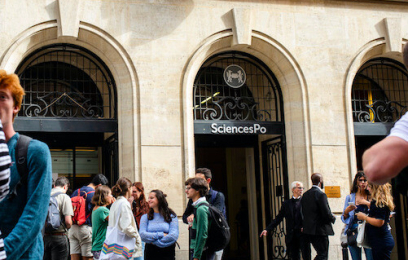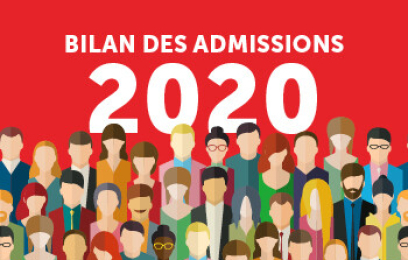The 2019 Admissions Report reaffirms Sciences Po’s attractiveness as an institution, recording, for the second year running, over 20,000 applications (20,809 compared to 20,621 in 2018) from the undergraduate to the doctor level. An increase in selectivity (with the overall acceptance rate shifting from 21% in 2018 to 20% in 2019) and diversity among candidates is a stamp of the excellence of the university’s course offering. Total class numbers have remained stable this year.
Undergraduate Admissions
Sciences Po retains its appeal for high school students, with 11,123 applicants sitting the first round of entrance exams (including dual-degree programmes with French and international universities). That represents a 1.5 % increase from 2018, which saw 10,957 high school students apply. 2019 applicants came from almost 1,600 high schools across France and 1,000 schools around the world.
This year, the exam procedure brought in 5,794 candidates, a 2% increase in comparison to the previous year (5,680 in 2018). 3,343 applicants applied via the international procedure or for one of our nine international dual-degrees (compared to 3,325 in 2018), and 857 via the Equal Opportunity Programme (976 in 2018).
All procedures considered, 1,960 students were admitted, a stable intake in relation to last year (1,904 students admitted in 2018), preserving highly selective entry. Among French students admitted this year, more came from outside of the Île-de-France region (59%). Overall, the successful candidates came from 93 countries worldwide. 72% of accepted students began study at one of our six regional campuses in France.
Master’s Admissions
This year, 8,952 candidates applied to our master’s programmes (compared to 8,915 in 2018). A total of 3,771 candidates applied via the French procedure, a stable figure in relation to the previous year (3,717 in 2018). 5,181 students applied via the international procedure and for dual-degrees (5,198 in 2018).
Applications from certain streams continue to increase, in line with the objectives for diversification of applicants which led to procedure reforms in 2017 (replacement of the written exam with a double evaluation of the application portfolio): +24% of applicants came from engineering schools, +19% from scientific studies, +20% from business schools, and +12% from economics studies.
2,047 students were admitted to master’s programmes (compared to 2,108 in 2018). 72% of these were accepted via the international procedure or for international dual-degrees, a result that reinforces the success of our 38 dual-degrees established with partner institutions from 14 countries around the world.
Sciences Po remains one the most socially inclusive selective institutions worldwide
With 2,094 students admitted via our Equal Opportunities Programme since the launch of the initiative in 2001, Sciences Po positions itself as a key actor in social diversity within higher education. Above and beyond the Equal Opportunities Programme, our sliding-scale system of fee allocation and extensive policy of financial aid help to boost the social inclusivity of our institution. Sciences Po sets aside a total of approximately 11.1 million euros to go towards the financial aid that benefits 36% of our students (in the form of tuition fee adjustments, needs based scholarships, assistance for students with disabilities, etc).
About Sciences Po
Founded on values of openness and excellence, Sciences Po is an international research university, both selective and open to the world, ranking among the finest institutions in the fields of humanities and social sciences. Its unique model combines a multidisciplinary outlook with a focus on professional application, in order to train leaders capable of understanding and transforming society. Sciences Po ranks fourth worldwide in the field of Social Sciences and International Relations (QS 2018). Diversity is an integral element of Sciences Po’s identity, with international students from over 150 countries making up 47% of the student body, and 26% of students receiving scholarships (compared to 6% en 2000). http://www.sciencespo.fr/en
Press contact
Marie Frocrain: marie.frocrain@sciencespo.fr / 01 49 54 37 7

15.04.2021
Admissions post-bac 2021 :
Plus de 15 000 candidatures validées sur Parcoursup
Paris, le 15 avril 2021 - Pour sa première campagne se déroulant intégralement sur Parcoursup, Sciences Po enregistre 15 284 candidatures validées à l’issue de la première phase qui s’est close le 8 avril 2021, soit une augmentation de 103 % par rapport aux candidatures enregistrées en 2020 par les procédures françaises d’entrée en première année. Ces voeux validés concernent les 12 formations proposées par l’institution sur la plateforme (cf. communiqué du 20 janvier 2021). Les candidatures augmentent également de 27 % pour les procédures niveau master (française et internationale). Sciences Po confirme son attractivité auprès d’un panel élargi de lycéens et d’étudiants.
Les lycéens ayant suivi leur scolarité dans un établissement partenaire CEP passent cette année la même procédure que les autres candidats français et internationaux, dans un cadre de préparation qui leur est propre. 10 % des places leur seront réservées en 2021, l’objectif étant de porter ce chiffre à 15 % en doublant le nombre de lycées partenaires d’ici 2023.
Des candidatures évaluées de façon qualitative, sans apport des algorithmes
Les équipes de Sciences Po et les enseignants du secondaire sont fortement mobilisés pour réaliser une double évaluation de l’ensemble des dossiers. Environ 800 évaluateurs (enseignants, membres de la direction, personnels pédagogiques) sont à pied d’œuvre pour analyser ces candidatures.
Deux des quatre épreuves de la procédure d’admission, notées sur 20, sont en effet évaluées par des binômes expérimentés, sans l’appui d’un algorithme. La première concerne la performance académique et la trajectoire du candidat à partir des notes obtenues de la Seconde à la Terminale, de la progression de l’élève et des appréciations de ses professeurs. La deuxième sanctionne trois écrits personnels du candidat : sur son parcours personnel, ses activités et ses centres d’intérêt ; sur sa motivation et son projet intellectuel pour Sciences Po et enfin sur un essai personnel sur l’une des cinq thématiques proposées. Exigeantes et complètes, ces épreuves valorisent de manière combinée l’excellence académique du candidat, ses qualités extra-scolaires et son projet d’études supérieures à Sciences Po.
La note relative aux résultats du baccalauréat, également sur 20, retiendra les résultats obtenus dans le cadre du contrôle continu du fait de la non tenue des épreuves anticipées.
L’oral, quatrième épreuve prévue en mai
La quatrième note prise en compte pour l’admission à Sciences Po est celle de l’entretien oral qui sera organisé en mai à distance et que passeront les candidats ayant obtenu une note cumulée pour les trois épreuves sur dossier égale ou supérieure à la note minimale sur 60 fixée par le jury. Les convocations aux oraux seront envoyées début mai. Les candidats ayant obtenu une note inférieure à la note requise se verront notifier leur non-admission via le portail Parcoursup fin mai.
A l’issue de l'intégralité de la procédure pour les candidats invités à l’oral, les propositions d’admission seront formulées sur la base de l’obtention d’une note consolidée à l'issue des quatre épreuves qui devra atteindre ou dépasser la note d’admission minimale fixée par le jury d'admission.
À propos de Sciences Po
Fondée sur des valeurs d’ouverture et d’excellence, Sciences Po est une université de recherche sélective de rang international dont le modèle unique associe spécialisation en sciences humaines et sociales, pluridisciplinarité et ancrage professionnel pour former des acteurs qui comprennent et transforment la société. La diversité étant un élément structurant de son identité, Sciences Po compte 47 % d’étudiants internationaux issus de 150 pays et 26 % des élèves sont boursiers contre 6 % en 2000.
Contact presse :
Marie Frocrain : marie.frocrain@sciencespo.fr / 01 49 54 37 71
Lire plus

